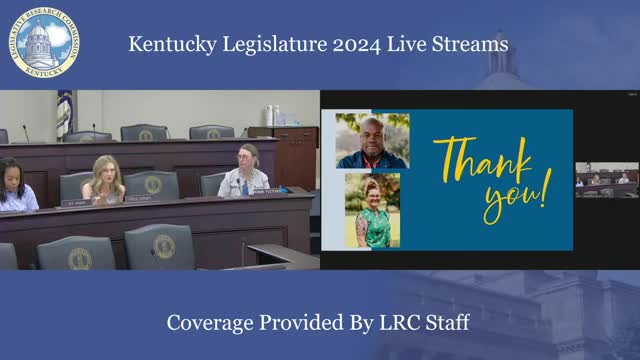Advocates push for transformative juvenile justice reforms
June 22, 2024 | Department of Juvenile Justice, Justice, Governor's Secretary of the Cabinet, Organizations , Executive, Kentucky

This article was created by AI summarizing key points discussed. AI makes mistakes, so for full details and context, please refer to the video of the full meeting. Please report any errors so we can fix them. Report an error »

During a recent government meeting, discussions centered on the critical role of community support in addressing the needs of families affected by crime, particularly in the juvenile justice system. Participants emphasized the importance of collaboration with local schools and community organizations to provide comprehensive support for young individuals and their caregivers.
One key focus was on the necessity of establishing partnerships with schools to ensure that young people receive the resources they need. Representatives highlighted their approach of conducting needs assessments within households, which includes engaging with caregivers to understand their challenges and the resources available to them. This holistic approach aims to address not only educational needs but also basic necessities such as clothing and hygiene, which can impact a child's ability to attend school.
The meeting also touched on the importance of mental health support for youth. A representative noted that previous therapeutic initiatives did not adequately serve the population, particularly when caregivers were unwilling to participate. As a result, there is an ongoing effort to collaborate with mental health providers to create more accessible and effective support systems for young people seeking help.
Legislators expressed strong support for these initiatives, recognizing the potential for significant positive change within the juvenile justice system. They underscored the importance of focusing on rehabilitation rather than punitive measures, advocating for a model that meets young people where they are and fosters their development.
The discussions also highlighted the dual focus on youth advocacy and victim advocacy, stressing that addressing the needs of victims is integral to the success of youth programs. Participants called for a narrative shift that acknowledges the interconnectedness of these issues, reinforcing the idea that supporting young people also involves recognizing and addressing the harm experienced by victims.
Overall, the meeting underscored a commitment to fostering a supportive community environment that prioritizes the well-being of both young individuals and their families, aiming to create a more effective and compassionate juvenile justice system.
One key focus was on the necessity of establishing partnerships with schools to ensure that young people receive the resources they need. Representatives highlighted their approach of conducting needs assessments within households, which includes engaging with caregivers to understand their challenges and the resources available to them. This holistic approach aims to address not only educational needs but also basic necessities such as clothing and hygiene, which can impact a child's ability to attend school.
The meeting also touched on the importance of mental health support for youth. A representative noted that previous therapeutic initiatives did not adequately serve the population, particularly when caregivers were unwilling to participate. As a result, there is an ongoing effort to collaborate with mental health providers to create more accessible and effective support systems for young people seeking help.
Legislators expressed strong support for these initiatives, recognizing the potential for significant positive change within the juvenile justice system. They underscored the importance of focusing on rehabilitation rather than punitive measures, advocating for a model that meets young people where they are and fosters their development.
The discussions also highlighted the dual focus on youth advocacy and victim advocacy, stressing that addressing the needs of victims is integral to the success of youth programs. Participants called for a narrative shift that acknowledges the interconnectedness of these issues, reinforcing the idea that supporting young people also involves recognizing and addressing the harm experienced by victims.
Overall, the meeting underscored a commitment to fostering a supportive community environment that prioritizes the well-being of both young individuals and their families, aiming to create a more effective and compassionate juvenile justice system.
View full meeting
This article is based on a recent meeting—watch the full video and explore the complete transcript for deeper insights into the discussion.
View full meeting
